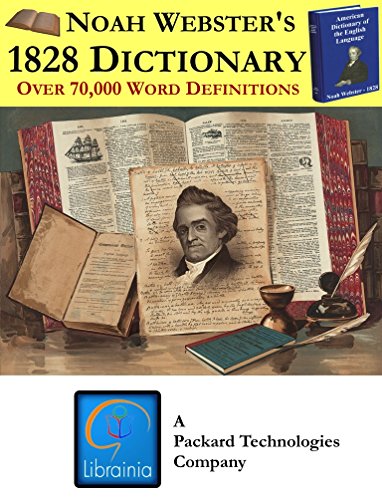American Dictionary of the English Language (1828 Edition)
Noah Webster
BOOK REVIEW

In the vast landscape of the English language, few works stand out as monumental as the American Dictionary of the English Language (1828 Edition) by Noah Webster. This isn't just any ordinary dictionary; it is the lifeblood of American identity, a torchbearer of language that has shaped the very essence of communication across the nation. In an era when America was still figuring out what it meant to be American, Webster took it upon himself to codify the language and create a distinctly American version of English that resonated with the spirit of independence.
Diving into Webster's world is akin to stepping into a vibrant tapestry woven with threads of ambition, nationalism, and cultural evolution. Born in 1758 in West Hartford, Connecticut, the life of Noah Webster was intricately tied to the nascent ideals of the United States. As a soldier in the Revolutionary War, educator, and linguist, he understood better than most that language is a powerful tool of unity and expression. The dictionary was not merely a compilation of words; it was a clarion call for a shared American identity. 🌟
The 1828 edition was revolutionary. Before this, dictionaries focused mainly on definitions. Webster, however, boldly took on the task of providing not just meanings, but also pronunciations and etymological insights, encapsulating the history and evolution of words. His aim was to ensure that American English would not simply mimic British forms but carve out its unique path, reflecting the diverse experiences and thoughts of Americans. This bravery amongst the fog of cultural imperialism is what makes the dictionary a piece of historical significance beyond mere words.
Think of Webster as the ultimate cultural architect, laying the foundations for a language that would include the rhythms of everyday life, the unique slang of its time, and the influences of the myriad immigrant cultures that wove themselves into the American fabric. By starkly contrasting American English with its British counterpart, he empowered a nation of speakers to embrace their linguistic identity. This was no minor feat-it was an act of cultural rebellion! 🗽💥
Reflecting upon contemporary feedback reveals an interesting dichotomy of admiration and criticism. Many readers laud Webster's dedication to promoting Americanism through language, calling it an essential tool for students and educators alike. They argue that the dictionary helped standardize the language, making communication more effective and thus enhancing education. Others, however, view it through a more critical lens, questioning the need to "Americanize" language at the expense of losing the richness embedded in its British origins. This lively debate only reinforces the notion that language is anything but static; it's a living, breathing entity that evolves through cultural exchange and contention.
As we ponder Webster's legacy, we cannot ignore the profound implications of this work. The dictionary has influenced countless authors, educators, and thinkers, from literary giants like Walt Whitman to modern-day educators who impassion their students with the beauty of the English language. It acted as a guiding star, illuminating the path toward linguistic unity and identity amid the chaos of a burgeoning nation.
To delve into the american Dictionary of the English Language (1828 Edition) is to immerse oneself in a world where language was not just a means of communication, but an instrument of transformation. Can you feel the weight of words shaping the consciousness of a nation? Can you envision the echoes of discourse that have rippled through time, from Webster's time to our own? It is a call to action for every language lover and cultural historian to appreciate the relentless pursuit of clarity and identity in communication.
The essence of Noah Webster's work transcends the mere mechanics of linguistics. It stirs something deep within each of us: a realization that language is our greatest ally in the quest for connection, understanding, and expression. So, if you haven't grasped this essential work, consider it more than just a reference - it's a portal into the soul of America, a testament to resilience, creativity, and the endless journey of self-discovery. 🌍✨️
📖 American Dictionary of the English Language (1828 Edition)
✍ by Noah Webster
2014
#american #dictionary #english #language #1828 #edition #noah #webster #NoahWebster